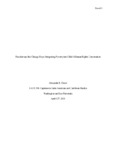| dc.rights.license | In Copyright | en_US |
| dc.creator | David, Alexander Beshara | |
| dc.date.accessioned | 2021-06-30T14:35:27Z | |
| dc.date.available | 2021-06-30T14:35:27Z | |
| dc.date.created | 2021 | |
| dc.identifier | WLURG38_David_LACS_2021 | |
| dc.identifier.uri | http://hdl.handle.net/11021/35406 | |
| dc.description | Capstone; [FULL-TEXT RESTRICTED TO WASHINGTON AND LEE UNIVERSITY LOGIN] | en_US |
| dc.description | Alexander Beshara David is a member of the Class of 2021 of Washington and Lee University. | en_US |
| dc.description.abstract | From 1973 to 1990, Augusto Pinochet ruled Chile as a callous military dictator. During his reign, Pinochet's regime committed manifold human rights violations against innocent Chileans -- tens of thousands were unjustly imprisoned, tortured, murdered or disappeared (Amnesty International). Given the magnitude of these abuses, it is no surprise that they have dominated the conversation of human rights violations committed during the Pinochet era. In fact, Chileans are still fighting to obtain justice and reparations for victims and survivors alike; something they've been denied for decades (Amnesty International). Despite their continuing importance and relevance, this research will not focus on the abovementioned human rights abuses. Rather, I hope to shed light on an issue that, in the conversation of human rights in Chile and the Southern Cone more broadly, is oftentimes neglected and overlooked: poverty. In recent years, Chile has been heralded as "a beacon of economic growth and stability" (Cuffe). The World Bank has even labeled the nation as an "upper-middle-income country" with one of the region's highest GDPs per capita (Cuffe). Much of this can be traced back to the neoliberal economic policies implemented during Pinochet's regime. Yet, despite their relative economic success and strength over the past few decades, Chile suffers from severe economic inequality: the nation's GINI index, which measures income inequality, is lower than Bolivia's, which is a lower-middle-income country (Cuffe). Essentially, Chile's designation as an upper-middle income country, based on a variety of economic indicators, means that international humanitarian aid organizations are unlikely to assist Chile despite its worrisome levels of economic inequality (Cuffe). The human rights approach to poverty reduction, which stipulates that "human rights can both enhance our understanding of inequality and serve as an important antipoverty tool" will offer a more nuanced and comprehensive conception of poverty; a perspective that will lead to more effective poverty intervention and alleviation efforts (Brodie 711). | en_US |
| dc.description.statementofresponsibility | Alexander B. David | |
| dc.format.extent | 27 pages | en_US |
| dc.language.iso | en_US | en_US |
| dc.rights | This material is made available for use in research, teaching, and private study, pursuant to U.S. Copyright law. The user assumes full responsibility for any use of the materials, including but not limited to, infringement of copyright and publication rights of reproduced materials. Any materials used should be fully credited with the source. | en_US |
| dc.rights.uri | http://rightsstatements.org/vocab/InC/1.0/ | en_US |
| dc.subject.other | Washington and Lee University -- Capstone in Latin American and Caribbean Studies | en_US |
| dc.title | Pinochet and the Chicago Boys: Integrating Poverty into Chile's Human Rights Conversation (thesis) | en_US |
| dc.type | Text | en_US |
| dcterms.isPartOf | RG38 - Student Papers | |
| dc.rights.holder | David, Alexander Beshara | |
| dc.subject.fast | Pinochet Ugarte, Augusto | en_US |
| dc.subject.fast | Income distribution -- Government policy | en_US |
| dc.subject.fast | Human rights | en_US |
| dc.subject.fast | Chile | en_US |
| local.department | Latin American and Caribbean Studies | en_US |
| local.scholarshiptype | Capstone | en_US |
